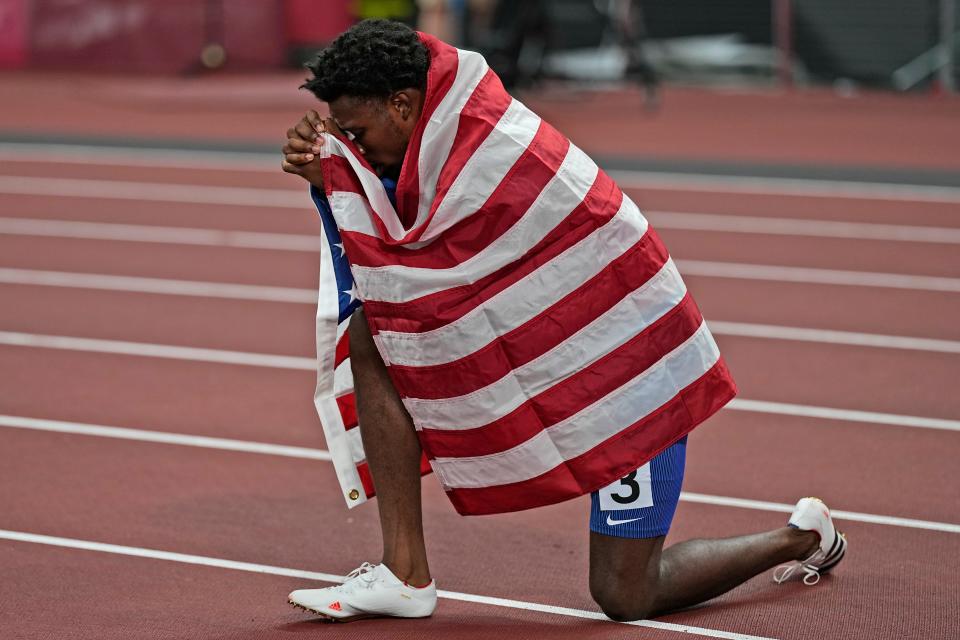Opinion: Noah Lyles' emotional reaction to 200-meter bronze turns into platform for mental health
TOKYO — If these Olympics have shown anything, it’s that we have no idea who these athletes are that we cheer and celebrate.
Their performances evoke strong feelings and emotions in us, yet we have no idea about theirs. The demons they’re fighting or the challenges they’re facing. We see what we want to see and avoid looking any further.
When Noah Lyles crouched on the track after the 200-meter final Wednesday night, overcome with emotion, the assumption was that he was disappointed with the bronze medal he’d just won. He wasn’t happy, Lyles acknowledged afterward. As the reigning world champion in the distance, how could he be?
“Not what I wanted,” Lyles said. “At the same time, it’s a great achievement. It’s just another sign you can’t take anything for granted. It’s nice to have. But I want more.”
REMEMBERING THE GOAT: Simone Biles didn't win any golds in Tokyo but still enhanced her legacy
MONEY FOR MEDALS: Olympic glory can also be very lucrative for athletes from these countries

There was more beneath the surface, though. As Lyles spoke, he mentioned his younger brother, Josephus, who is also a runner but whose career has been slowed by injuries and health problems.
Born a year and five days apart, the Lyles brothers have always been a tandem. They raced together in junior high, turned pro together out of high school and still train and live together in Florida.
The world title, the Olympics, the fame and the fortune – sprinting has brought Noah Lyles all of that and more.
And yet, this didn’t begin as his dream. It was borrowed from his brother.
“In 2012, my brother had the dream that he was going to come to the Olympics and I really just tagged along for the ride,” Lyle said, choking back tears. “Sometimes I think to myself, `This should be him.’ I’d be OK not being here, you know? Because I feel like I have a lot of talents and I feel I can go in different directions.
“He’s talented in his own right. But at the same time, this wasn’t even my dream. I just really tagged along because I love my brother and I wanted to do this together. It’s taken us so far, and I’m just like, he should be here.”
Those assumptions we make, those narratives we create -- they don’t always reflect reality, and we can’t know that because we rarely care enough to ask.
But that’s true for all of us, isn’t it? We bury our emotions, put on brave faces and keep going, unwilling or too afraid to share our burdens with someone else.
“The biggest problem is actually admitting this is an issue,” Lyles said. “If everybody kept tabs on everybody constantly, it would be more of an easier place. If everybody had more of a safe place, in general.
“Just saying that this is a safe place, that doesn’t really make it a safe place, a place you can actually be OK of letting go of your fears and saying, 'I am scared,’” Lyles added. “I’ve definitely said that quite a few times this year. It’s OK. Admitting it is the first step to getting better.”
Lyles has been open about having depression, and that he takes medication and is in therapy to control it. Maybe it’s because this has been part of his life for almost his long as he can remember; his mother has anxiety and depression, and when she recognized signs of it in her young son, she put him in therapy.
Maybe it’s because he has other outlets. Lyles has always loved art, be it drawing, designing or making music. He has turned a closet in a guest bedroom into a recording studio, and has set up drawing tables in a corner of the room.
Or maybe it’s simply because that, in addition to being one of the fastest men on the planet, he’s also a human being just like everyone else. Lyles spent 15 minutes with reporters after his race, fielding at least a half-dozen questions about mental health issues, and he answered them all candidly.
“To be honest, the reason I’m telling you guys is I want you to go tell others. I want other people to know that there’s a better way,” Lyles said. “I don’t want anybody to go out there and think, 'Well so and so isn’t doing it.’ Well so and so is doing it, and they don’t want you to have to go through what I’ve gone through.”
The COVID-19 pandemic has shaped these Olympics, but it is athletes’ unexpected and brutal honesty about their mental health challenges that has come to define them.
Simone Biles withdrew one event into the team competition and then missed the all-around and first three event finals because rising anxiety had caused her to lose her sense of air awareness. Raven Saunders acknowledged being suicidal in early 2018. Dutch cyclist Tom Dumoulin won a silver medal in the time trial less than two months after returning from a six-month break he took because of mental fatigue.
“I don’t think I’ve changed at all, to be honest. This has always been me,” Lyles said when asked if he feels freer to raise issues about mental health now. “If it’s encouraged other people to talk, I guess that’s all I can really ask for.
“Even affecting one person,” he added, “is the goal.”
Follow USA TODAY Sports columnist Nancy Armour on Twitter @nrarmour.
This article originally appeared on USA TODAY: Noah Lyles turns bronze medal into platform for mental health

